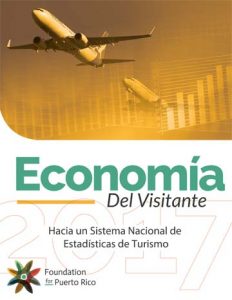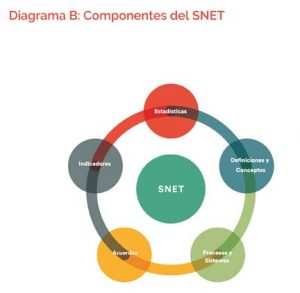Study: Tourism’s contribution to PR ‘difficult to assess’


Foundation for Puerto Rico outlines the necessary steps for the development of a National Tourism Statistics System (SNET) where the island can measure the impact of the visitor economy.
Puerto Rico’s lack of a comprehensive set of tourism data makes it difficult to the assess the sector’s performance, as the island lacks indicators to compare with the rest of the world, among other shortcomings, a study by the Foundation for Puerto Rico revealed Tuesday.
The nonprofit, which has spent the better part of this year analyzing the need for a “National Tourism Statistics System,” or SNET by its initials in Spanish, confirmed that “we lack indicators to compare with the rest of the world, measure tourism incompletely and use an incorrect conceptual framework.”
Arnaldo Cruz, director of Research and Analysis for Foundation for Puerto Rico, on Tuesday presented the nonprofit’s most recent study, entitled “Visitor Economy: The path toward a SNET,” which details the steps necessary to develop the island’s first “Tourism Statistics System.”
In this document, the Foundation lists the main elements of this system, which go beyond data collection, as they include the conceptual framework (definitions and concepts), systems and processes for information and estimates management; as well as the collaboration agreements, necessary to manage the system in an orderly and systematized manner.
“As with all our previous studies, we conducted an in-depth analysis of Puerto Rico’s current situation in relation to tourism statistics,” he said. “To provide context, we identified nine statistical tables recommended by the World Tourism Organization, which unfortunately Puerto Rico does not produce, while other destinations do.”
“Likewise, we point out methodological errors with statistics that are currently being published,” said the expert in economics and quantitative methods.
As recently as last Saturday, the Spanish newspaper El País — referring to tourism growth in Puerto Rico due to the success of “Despacito,” a song by Puerto Rican singers Luis Fonsi and Daddy Yankee — questioned the increase in tourism reported both by the Latino and Spanish press, since, according to the publications, no official Puerto Rican source has confirmed the number.
“It is unacceptable that Puerto Rico cannot produce concrete and accessible data on our tourism activity. That is why we advocate for the development of this National System of Tourism Statistics that will allow us not only to know where we are and how much we have grown not only compared to previous years, but more importantly, it places us in the context of our competitors around the world,” Cruz said.
Given this scenario, the nonprofit is making specific recommendations to advance the creation and development of this statistical system.
“The first thing that has to happen is to understand the need to break with the limited practice of measuring tourism using only data from endorsed hotels and cruises. If we do not change this paradigm to include other indicators, we will never be able to move toward the development of this system,” said Cruz.
The second recommendation is the creation of a multi-sector working committee that, together with government, will work on the implementation of the different components of SNET and their compliance.
Finally, taking into consideration that it will take time to comply with all the statistics requirements established by UNWTO, the organization proposes to start working immediately with three tools essential for the development of the SNET: the Traveler Survey, the Product Input Matrix and the Income Survey And Household Expenditures that allow us, among other things, to know the demographic and consumer patterns of our visitors.
It should be noted that, thanks to a multi-sector alliance promoted by the Foundation for Puerto Rico, the Traveler Survey was finally re-started in 2016, after lacking a document of this kind for four years.
“Due to the great gap that exists with the statistics and the challenges that the government has with the national accounts, we are forced to be practical with our recommendations,” Cruz said.
“However, the development of the SNET will allow us to construct in the future a Tourism Satellite Account that meets the requirements of the WTO,” he added. “Meanwhile, we need processes and systems that allow us to produce a minimum set of statistics that can shed light on tourism in Puerto Rico and its impact on the economy.”
Proposal gets positive support
The study released Tuesday received positive support from the Puerto Rico Institute of Statistics and local economists, the Foundation said.
“Considering Puerto Rico’s great tourist assets, it is inconceivable that we do not have a National System of Tourism Statistics, the same as the other islands of the Caribbean,” said Statistics Institute Executive Director Mario Marazzi.
“This is a situation that the Institute of Statistics has been trying to improve, for example, through our contribution with the Traveler Survey. It is also a situation that we want to continue attending with the prompt completion of an Income and Expenditure Survey,” he said.
“The study conducted by Foundation for Puerto Rico arrives just at the right time to start developing the system. We hope that the re-structuring of tourism services, through the creation of the DMO, will serve as a catalyst for this purpose,” Marazzi said.
Meanwhile, Economist Heidi Calero, president of H. Calero Consulting, said “the challenge to improve the tourism statistics is not only to raise awareness among related government agencies, but mainly so that the private sector provides the monetary resources and necessary information to incorporate statistics relevant to tourism activity in the national accounts that are suggested in their study.”
Economist Joaquín Villamil, said the Foundation’s study is a “positive contribution so that we can have better information and be able to make better decisions.”
Antonio Fernós, economist and professor at the Inter American University, said not only does the recent study justify paying more attention to tourism statistics, “but it also reveals the core of the issue: providing a tool for integrating and coordinating statistics into the world of everyday life as a mechanism for recovering the credibility of our institutions.”
“Puerto Rico is experiencing, in addition to an economic and financial crisis, a credibility crisis of its data collector apparatus. Without credibility, there is no economic growth. And to have credibility, you must earn it … Foundation for Puerto Rico has achieved institutional credibility with this report,” Fernós said.
Foundation opens discussion about SNET
To widely discuss the need for the SNET, and to learn the perspectives of experts on economic and statistics issues, Foundation for Puerto Rico will hold a forum on the subject July 21.
A panel discussion will be led by Marazzi, Luis García-Pelatti, former president of the Puerto Rico Planning Board; Villamil and Fernós.
“We restate our demand to the government and the main stakeholders of the ecosystem to adopt the concepts embodied in this study and to commit to review their measurement indicators,” Cruz said.
“We request that government measures the development and promotion management of the destination based on the consumption of all the tourist activity instead of on the registration number in hotels,” he said.
Hoteliers are asked to incorporate a broader view of consumption (beyond the hotel grounds) due to the growth of interactions between their guests and other tourist products and services which end up having a positive impact on consumption in accommodation.
“At the Foundation we believe that if we have the right conceptual framework for the measurement, we will have better plans and results; thus, validating the importance of visitor economy for our entire island,” Cruz said.
“We are eager to work with all sectors to achieve the goal of having reliable and constant statistics on our tourism activity,” he concluded.
To register and learn more about the forum, click here. The study can be downloaded for free through this link.














